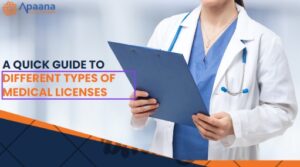Sharing is caring!

Licensed medical professionals form the backbone of the US healthcare system, providing critical care and expertise to patients. This blog outlines the comprehensive roadmap aspiring individuals must navigate to achieve their dreams of becoming licensed medical professionals.
How to become a medical professional, from choosing a medical career to meeting licensing requirements and developing essential skills?
- Choosing Your Medical Career
The first step is choosing a medical career that aligns with your passion and skills. From doctors and nurses to therapists and technicians, the options are diverse. Evaluate your strengths and interests, and research the roles thoroughly to make an informed decision. Considering the demand and growth prospects of each field can guide your choice. - Education Requirements
The path to becoming a licensed medical professional begins with a solid educational foundation. Different careers require different educational paths, such as medical school, nursing programs, or allied health programs. Meeting prerequisites like high school coursework, science classes, and standardized tests is crucial. Keep in mind the competitive nature of admissions, underscoring the need for dedication and perseverance. - Selecting the Right Institution
Researching and selecting the right educational institution is vital. Look for accredited schools with a reputable track record. Factors like program reputation, faculty expertise, clinical training opportunities, and campus facilities should influence your decision. Consider financial aid options, including scholarships, grants, and loans, to ease the financial burden. - Navigating the Rigorous Academic Journey
The academic journey in medicine is demanding, requiring effective time management, study techniques, and collaborative learning. Practical experience gained through internships and clinical rotations is invaluable for building hands-on skills. Emphasize resilience and adaptability to overcome challenges and succeed academically. - Meeting Licensing Requirements
Each medical profession has specific licensing requirements that must be met to practice legally. This often includes passing rigorous licensing exams, completing clinical hours, and meeting evaluation criteria. Prepare thoroughly for these exams and stay updated on licensing regulations to ensure a smooth path to licensure. - Developing Soft Skills
Beyond technical expertise, soft skills are crucial in the medical field. Communication, empathy, teamwork, and cultural competence enhance patient care and professional relationships. Practice these skills through interactions with patients, peers, and mentors, fostering a well-rounded approach to healthcare. - Staying Current in Your Field
Medicine is an ever-evolving field, demanding continuous learning. Engage in continuing education through workshops, conferences, and online resources. Professional associations offer networking opportunities and keep you updated on the latest developments, ensuring you remain at the forefront of your field. - Gaining Practical Experience
Residencies, internships, and clinical rotations provide practical experience, bridging the gap between theory and real-world application. These experiences shape your clinical competence and professional confidence, preparing you for the challenges of your medical career. - Navigating the US Job Market.
Entering the job market requires strategic networking, utilizing online job platforms, and leveraging professional connections. Craft an impressive resume that highlights your education, practical experience, and soft skills. Prepare for interviews with confidence, showcasing your passion and readiness to contribute to the healthcare industry. - Ethics and Patient Care
Ethical considerations are paramount in the medical profession. Uphold patient confidentiality, obtain informed consent, and prioritize patient well-being. Ethical practices not only enhance patient trust but also ensure the highest quality of care.
Conclusion
Becoming a licensed medical professional in the USA is a challenging yet immensely rewarding journey. By following this comprehensive roadmap, you’ll navigate through the complexities of education, practical experience, and ethical considerations. The impact you’ll make on individuals’ lives and the healthcare system is immeasurable. Embrace the dedication, passion, and continuous learning required, and embark on a fulfilling career that transforms lives.
Reference
- U.S. Bureau of Labor Statistics (BLS) – Provides information about various healthcare professions, including education requirements, job outlook, and salary data. Website: https://www.bls.gov/
- Association of American Medical Colleges (AAMC) – Offers information about medical school admissions, curriculum, and resources for aspiring doctors. Website: https://www.aamc.org/
- American Association of Colleges of Nursing (AACN) – Offers insights into nursing education and career paths, including licensure information. Website: https://www.aacnnursing.org/
- National Board of Medical Examiners (NBME) – Offers information on licensing exams for medical professionals, such as the United States Medical Licensing Examination (USMLE). Website: https://www.nbme.org/
- American Medical Association (AMA) – Provides resources for medical professionals and students, including ethical considerations and patient care guidelines. Website: https://www.ama-assn.org/




